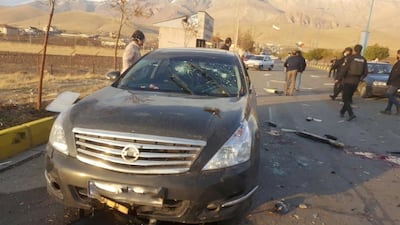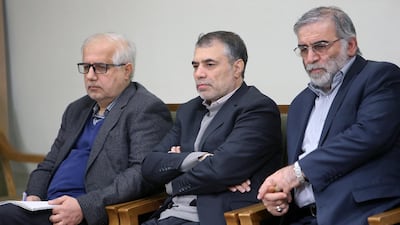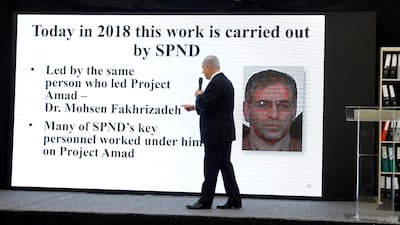Experts in automated weapons systems have cast doubt on Iranian claims that one of its top nuclear scientists was assassinated last month by an unmanned, satellite-controlled machinegun.
Iran has blamed Israel for the assassination of Mohsen Fakhrizadeh, the country’s top nuclear planner.
A senior military chief said the hit involved a “satellite-controlled smart system”, Iranian media reported.
Experts in automated arms systems said that while some technology for a robotic weapon exist, they were most likely not used in the attack on Fakhrizadeh.
"This is a dangerous development but I recommend caution before declaring it a fully autonomous weapon," Mary Wareham, co-ordinator of the Campaign to Stop Killer Robots, told The National.
“There are a lot of unanswered questions about how the weapon system functioned.”
Ms Wareham, who also advocates against automated arms for Human Rights Watch, said the idea of a satellite-controlled machinegun “does not make much sense”.
Arthur Holland, a weapons expert at the UN Institute for Disarmament Research think tank, said that only some of the technology necessary for such an automated hit was available.
Remotely firing a weapon through a satellite connection was largely credible but using artificial intelligence and facial-recognition systems and then firing with extreme accuracy was far-fetched, Mr Holland said.
"Just because individual technologies mentioned here exist doesn't mean that they can all function together as a single seamless system, especially not in an uncontrolled real-world environment like this," he said on Twitter.
Other experts reacted cautiously to Iran's claims, saying remote military weapons systems are typically too large to mount on civilian vehicles and bulky systems would be difficult to smuggle into Iran.
On Sunday, Rear Admiral Ali Fadavi, the deputy commander of Iran’s Islamic Revolutionary Guard Corps, told the country's semi-official Tasnim news agency that Fakhrizadeh was killed with a satellite-controlled machinegun using artificial intelligence.
The nuclear scientist was driving on a motorway outside Tehran along with 11 guards on November 27 when a machinegun mounted on a Nissan pick-up truck aimed at his vehicle and fired 13 rounds, Adm Fadavi said.
The machinegun was "controlled online" by satellite and used an "advanced camera and artificial intelligence" to carry out the assassination, he told the Mehr news agency.
It is unclear who was behind the killing but Iranian media said that weapons "made in Israel" were found at the scene.
This week, President Hassan Rouhani accused Israel of carrying out the hit on America's behalf.
Tehran has yet to provide any pictures of the equipment reportedly found at the ambush site.
Western and Israeli governments have long held the belief that Fakhrizadeh was the mastermind behind a secret Iranian nuclear weapons programme.
Tehran insists it only pursues peaceful use of nuclear technology.
Various accounts of the scientist's death surfaced after the attack, with Iran's Defence Ministry initially saying Fakhrizadeh was caught in a firefight.
The conflicting accounts may be caused by Iranian attempts to brush away an embarrassing security breach on its own soil.














